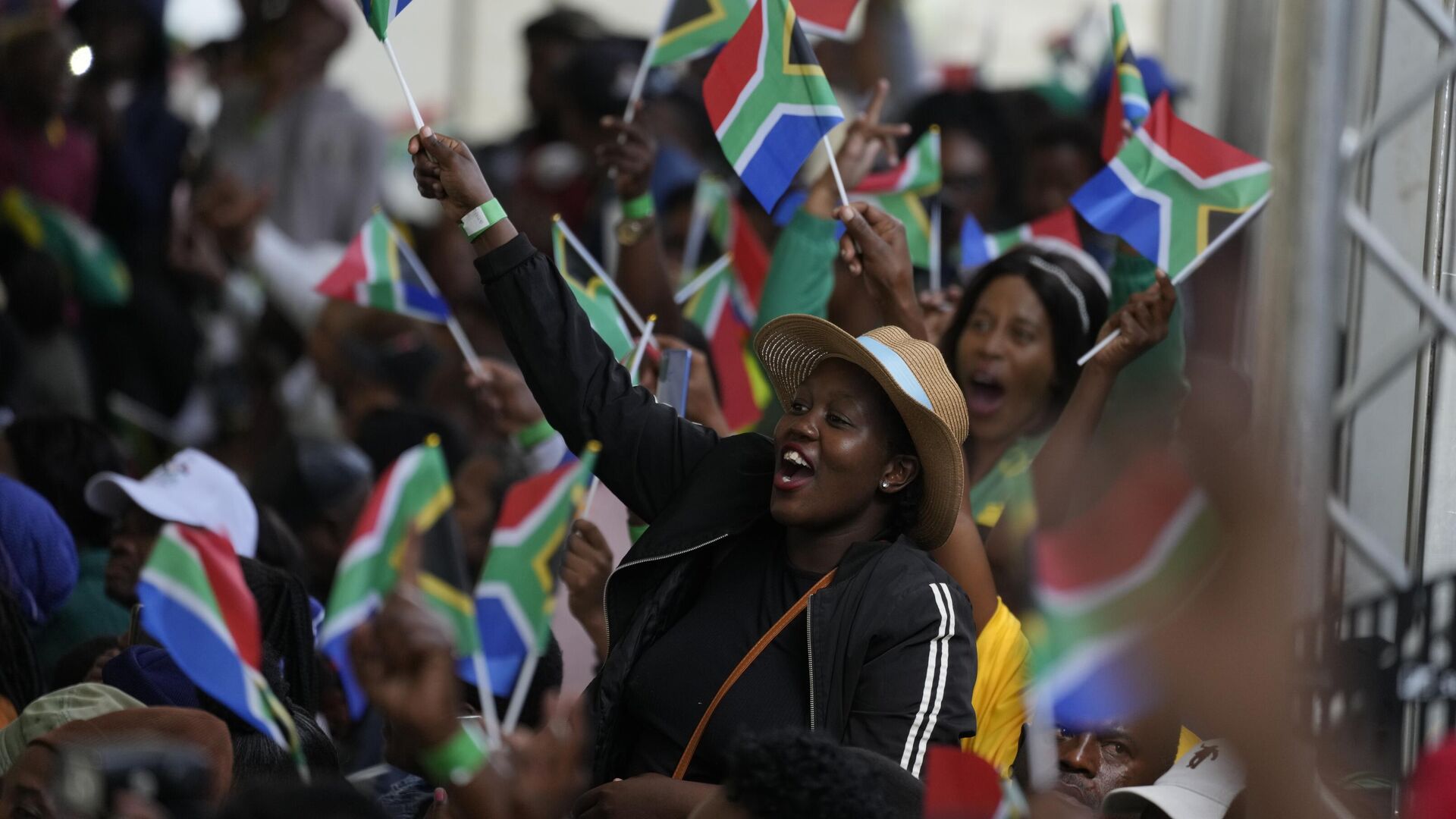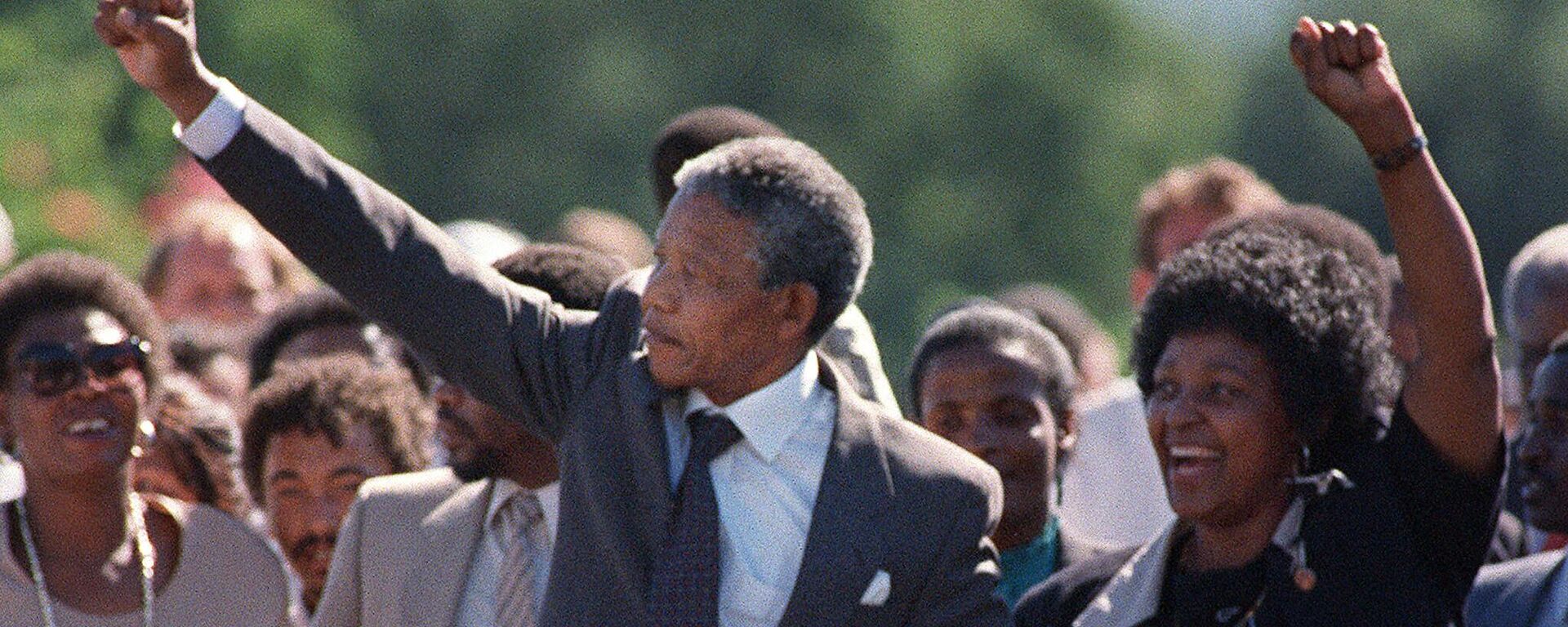https://en.sputniknews.africa/20240427/thirty-years-of-freedom-south-africa-celebrates-anniversary-of-first-post-apartheid-elections-1066258174.html
Thirty Years of Freedom: South Africa Celebrates Anniversary of First Post-Apartheid Elections
Thirty Years of Freedom: South Africa Celebrates Anniversary of First Post-Apartheid Elections
Sputnik Africa
Every year on April 27, South Africa pauses to commemorate Freedom Day, a public holiday that marks a pivotal moment in the nation's history. This day... 27.04.2024, Sputnik Africa
2024-04-27T15:38+0200
2024-04-27T15:38+0200
2024-04-27T15:38+0200
sub-saharan africa
politics
nelson mandela
south africa
african national congress (anc)
celebration
anniversary
national holiday
apartheid
anti-apartheid struggle
https://cdn1.img.sputniknews.africa/img/07e8/04/1b/1066258377_0:239:3216:2048_1920x0_80_0_0_fad20f15dd0b20d86d20ab0d5bda6662.jpg
The road to Freedom Day was long and arduous. In 1948, apartheid was introduced, a system of racial segregation that restricted the rights of the black majority and maintained white supremacy. The struggle for freedom involved numerous protests, uprisings, acts of civil disobedience, and armed resistance by various anti-apartheid movements, most notably the African National Congress (ANC).The turning point came with a negotiated settlement that led to the unbanning of liberation organizations, the release of political prisoners, including key ANC leader Nelson Mandela, and the return of exiles. This was followed by formal all-party negotiations that produced an interim constitution.The culmination of these events was the first non-racial elections held on April 27, 1994. This was the first time that anyone of voting age over 18 from any racial group, including foreign citizens permanently resident in South Africa, was allowed to vote. In these elections, Nelson Mandela was elected as the country's first black head of state and its first democratically elected president.South Africans typically celebrate Freedom Day in different ways. The day is marked by various events, including speeches by political leaders, rallies, concerts, cultural events and parades.Many commemorate the day by visiting places that honor the struggle for democracy in South Africa. This includes a trip to Robben Island, where Nelson Mandela was imprisoned, or a visit to Lilliesleaf Farm in Rivonia, once the nerve center of the liberation movement.South Africa's current president, Cyril Ramaphosa – a key ally of Nelson Mandela – has led the national celebrations of Freedom Day 2024 at the Union Buildings in Pretoria on Saturday, under the theme "30 Years of Democracy, Partnership and Growth".New ChallengesSince Freedom Day in 1994, South Africa has undergone significant changes. The end of apartheid marked the beginning of a new era of freedom and democracy in the country. The introduction of a new constitution granted equal rights to all South Africans and abolished the racially discriminatory system of apartheid.But while there have been improvements and increased acceptance in the right places over the past three decades, racism is still a reality in the daily lives of black South Africans through issues of economic inequality, according to Carvalho.Despite being the largest economy in Africa, South Africa's black majority continues to live in poverty with an unemployment rate of more than 32%, the highest in the world by 2023. More than 16 million South Africans rely on monthly social grants to survive.With South Africa's next general election set for May 29, President Ramaphosa recently unveiled the ANC party's election manifesto, outlining key promises focused on unemployment, economic growth and infrastructure development. To address the pressing issue of unemployment, the ANC has set a target of creating 2.5 million jobs over the next five years, with a commitment to gradually increase the social grant for the unemployed.
https://en.sputniknews.africa/20230612/prepared-to-die-for-equal-society-nelson-mandelas-journey-of-struggle-sacrifice-and-triumph-1059844942.html
south africa
southern africa
Sputnik Africa
feedback@sputniknews.com
+74956456601
MIA „Rossiya Segodnya“
2024
Muhammad Nooh Osman
https://cdn1.img.sputniknews.africa/img/07e7/04/0a/1058467512_0:0:1280:1280_100x100_80_0_0_ec723833bcbfcaed2e21952965ad99e4.jpg
Muhammad Nooh Osman
https://cdn1.img.sputniknews.africa/img/07e7/04/0a/1058467512_0:0:1280:1280_100x100_80_0_0_ec723833bcbfcaed2e21952965ad99e4.jpg
News
en_EN
Sputnik Africa
feedback@sputniknews.com
+74956456601
MIA „Rossiya Segodnya“
Sputnik Africa
feedback@sputniknews.com
+74956456601
MIA „Rossiya Segodnya“
Muhammad Nooh Osman
https://cdn1.img.sputniknews.africa/img/07e7/04/0a/1058467512_0:0:1280:1280_100x100_80_0_0_ec723833bcbfcaed2e21952965ad99e4.jpg
politics, nelson mandela, south africa, african national congress (anc), celebration, anniversary, national holiday, apartheid, anti-apartheid struggle, africa in details, africa insight, southern africa
politics, nelson mandela, south africa, african national congress (anc), celebration, anniversary, national holiday, apartheid, anti-apartheid struggle, africa in details, africa insight, southern africa
Thirty Years of Freedom: South Africa Celebrates Anniversary of First Post-Apartheid Elections
Muhammad Nooh Osman
Writer/Editor
Every year on April 27, South Africa pauses to commemorate Freedom Day, a public holiday that marks a pivotal moment in the nation's history. This day celebrates the first post-apartheid elections held in 1994, a watershed moment that signaled the end of more than three centuries of colonialism, segregation, and white minority rule.
The road to Freedom Day was long and arduous. In 1948, apartheid was introduced, a system of racial segregation that restricted the rights of the black majority and maintained white supremacy. The struggle for freedom involved numerous protests, uprisings, acts of civil disobedience, and armed resistance by various anti-apartheid movements, most notably the African National Congress (ANC).
The turning point came with a negotiated settlement that led to the unbanning of liberation organizations, the release of political prisoners, including key ANC leader
Nelson Mandela, and the return of exiles. This was followed by formal all-party negotiations that produced an interim constitution.
The culmination of these events was the first non-racial elections held on April 27, 1994. This was the first time that anyone of voting age over 18 from any racial group, including foreign citizens permanently resident in South Africa, was allowed to vote. In these elections, Nelson Mandela was elected as the country's first black head of state and its first democratically elected president.
"To some extent, April 27 in South Africa is seen by many people not only as the date of the 1994 elections, but in some ways it's like the date of South Africa's independence," Gustavo de Carvalho, a senior research fellow at the South African Institute of International Affairs (SAIIA), told Sputnik.
South Africans typically celebrate Freedom Day in different ways. The day is marked by various events, including speeches by political leaders, rallies, concerts, cultural events and parades.
Many commemorate the day by visiting places that honor the struggle for democracy in South Africa. This includes a trip to Robben Island, where Nelson Mandela was imprisoned, or a visit to Lilliesleaf Farm in Rivonia, once the nerve center of the liberation movement.
South Africa's current president,
Cyril Ramaphosa – a key ally of Nelson Mandela – has led the national celebrations of Freedom Day 2024 at the Union Buildings in Pretoria on Saturday, under the theme "30 Years of Democracy, Partnership and Growth".
Since Freedom Day in 1994, South Africa has undergone significant changes. The end of apartheid marked the beginning of a new era of freedom and democracy in the country. The introduction of a new constitution granted equal rights to all South Africans and abolished the racially discriminatory system of apartheid.
But while there have been improvements and increased acceptance in the right places over the past three decades, racism is still a reality in the daily lives of black South Africans through issues of economic inequality, according to Carvalho.
Despite being the largest economy in Africa, South Africa's black majority continues to live in poverty with an unemployment rate of more than 32%, the highest in the world by 2023. More than 16 million South Africans rely on monthly social grants to survive.
With South Africa's next general election set for May 29, President Ramaphosa recently unveiled the ANC party's
election manifesto, outlining key promises focused on unemployment, economic growth and infrastructure development. To address the pressing issue of unemployment, the ANC has set a target of creating 2.5 million jobs over the next five years, with a commitment to gradually increase the social grant for the unemployed.



